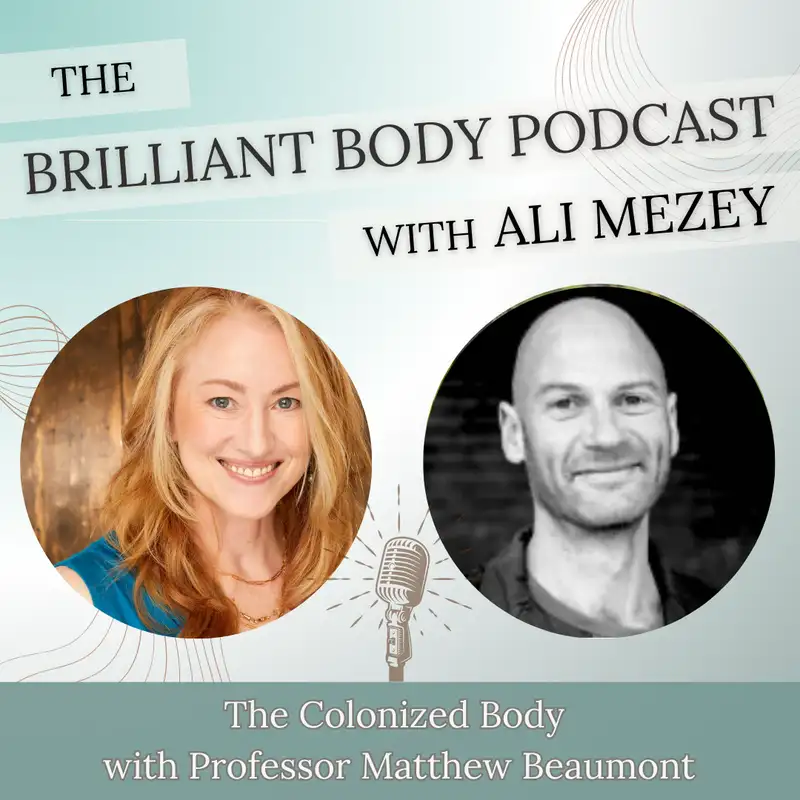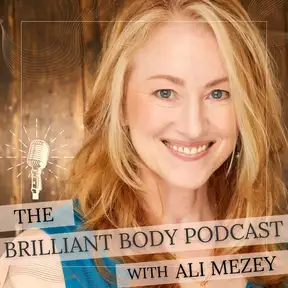The Colonized Body with Professor Matthew Beaumont: The Politics of Anatomy
In this episode, Ali speaks with Professor Matthew Beaumont, an English literature professor at University College London, who has just published his book, How We Walk: Frantz Fanon and the Politics of the Body about how the body reflects political and social oppression. They delve into topics such as the impact of racial oppression on physical movement, the cultural significance of walking, and how both personal and societal factors influence and restrict body expression. The conversation also touches on the influence of climate change on mental and physical health, the body's experience during the COVID-19 pandemic, and the intersection of dance, religion, and bodily freedom.
To be an angel to the podcast, click here
To be an angel to the podcast, click here
MORE ALI MEZEY:
Website: www.alimezey.com
Personal Geometry® and the Magic of Mat Work Course information:
Transgenerational Healing Films: www.constellationarts.com
Constellation Work is a highly effective method to delve into healing transgenerational trauma, unburdening consequent generations from the influences of traumas which can be transmitted epigenetically.
MORE MATTHEW BEAUMONT:
Instagram: @matthewhbeaumont
UCL Website
Constellation Work is a highly effective method to delve into healing transgenerational trauma, unburdening consequent generations from the influences of traumas which can be transmitted epigenetically.
MORE MATTHEW BEAUMONT:
Instagram: @matthewhbeaumont
UCL Website
Publisher Website
BOOKS:
How We Walk: Frantz Fanon and the Politics of the Body (London: Verso, 2024)
The Walker: On Losing and Finding Oneself in the Modern City (Verso, 2020)
Lev Shestov: Philosopher of the Sleepless Night (Bloomsbury, 2020)
Nightwalking: A Nocturnal History of London, Chaucer to Dickens (Verso, 2015)
BIO:
Matthew's research interests centre on various aspects of the metropolitan city, especially London. He is currently writing a history of literature about London for Cambridge University Press. He is also working on a book-length project about the role of insomnia in nineteenth and twentieth-century literature, painting and philosophy.
BOOKS:
How We Walk: Frantz Fanon and the Politics of the Body (London: Verso, 2024)
The Walker: On Losing and Finding Oneself in the Modern City (Verso, 2020)
Lev Shestov: Philosopher of the Sleepless Night (Bloomsbury, 2020)
Nightwalking: A Nocturnal History of London, Chaucer to Dickens (Verso, 2015)
BIO:
Matthew's research interests centre on various aspects of the metropolitan city, especially London. He is currently writing a history of literature about London for Cambridge University Press. He is also working on a book-length project about the role of insomnia in nineteenth and twentieth-century literature, painting and philosophy.
His most recent books are The Walker: On Losing and Finding Oneself in the Modern City (Verso, 2020), a series of chapters on writers including Chesterton, Dickens, Ford, Wells and Woolf, all of whom have placed the experience of walking in the metropolis at the centre of their attempts to understand and represent modernity; and Lev Shestov: Philosopher of the Sleepless Night (Bloomsbury, 2020), a book that revives the reputation of a neglected early twentieth-century Russian thinker by placing him in dialogue with Adorno, Benjamin, Deleuze and other continental philosophers.
Marcel Mauss, French Anthropologist “Technique du Corp” essay 1935
Charlie Hertzog Young: SPINNING OUT: Climate Change, Mental Health and Fighting for a Better Future
Charlie Hertzog Young: SPINNING OUT: Climate Change, Mental Health and Fighting for a Better Future
DEFINITIONS:
Cartesian Divide: The conceptual separation between mind and body, coined after René Descartes, emphasizing a dualistic view of human existence, isolating mental and physical aspects.
Cartesian Divide: The conceptual separation between mind and body, coined after René Descartes, emphasizing a dualistic view of human existence, isolating mental and physical aspects.
Our resources remain free as part of our mission to awaken people to the boundless potential of our bodies, inviting them to explore the profound knowledge, memory, brilliance & capacity within. By delving into the depths of our bodily intelligence as a healing resource for not just ourselves, but as a part of the larger, global body, we have the potential for meaningful change and experiences as bodies. Join us in this journey of transformation as we redefine our understanding of the human body and its infinite capabilities. While our events remain free, any contributions are deeply appreciated and are seen as a generous gesture of support and encouragement in sharing our messages with the world.
Sharing is free! And so is rating us! These are also incredibly helpful ways you can support us in sharing this transformative information.
[From time to time, a word or phrase goes wonky. Please forgive my wandering wifi.]

